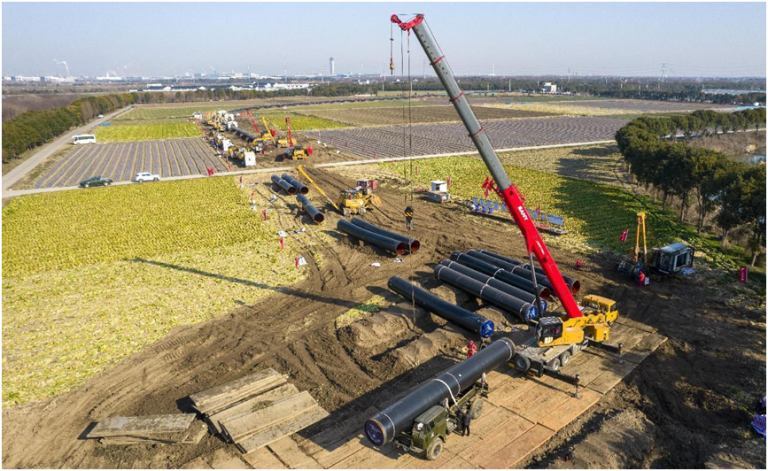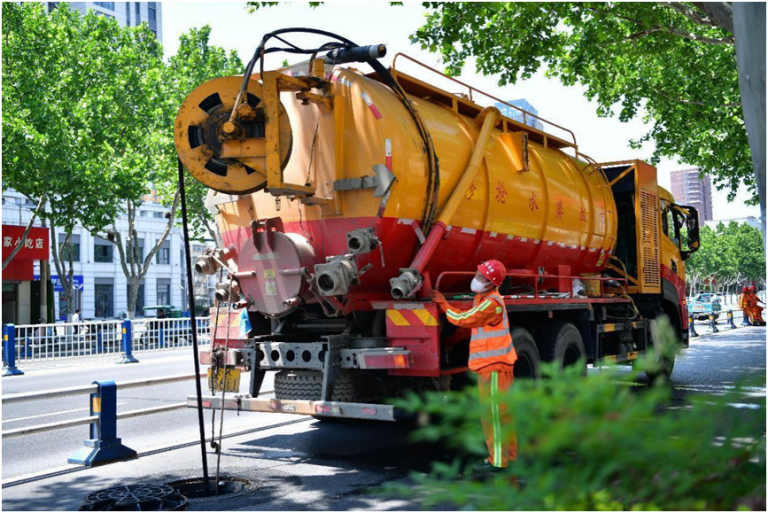
By Wang Junling, Wang Siqi
Wang Guiying is a 75-year-old womanliving in Zhaodong, northeast China’s Heilongjiang province. She lives in an old residential area built in 1990s. The area was not connected to natural gas pipeline network when it was built.
“In the past years, we cooked with gas cylinders,” the woman said, adding that it became more and more difficult for her to carry these gas bottles upstairs as she got older.
Thanks to a renovation program launched in Zhaodong since the last year, gas pipes have been installed in the residential area where Wang lives. “I’m looking forward to the day when these pipelines are put into use,” she said.
Gas pipeline renovation is one of the tasks recently raised by the Chinese government to renew municipal pipeline systems between 2022 and 2025. According to a national plan, basically all municipal pipeline systems will have been renovated by the end of 2025.
A man surnamed Chen who runs a restaurant in Huzhou, east China’s Zhejiang province is closely following the implementation of the plan.
According to him, his restaurant is on the ground floor of a high-rise residential building. The water pressure in the kitchen always becomes unstable when it comes to the peak hours of dining. Some neighbors upstairs are also troubled by this problem, he said.
“We consume a lot of water during the peak hours to cook and wash the dishes. When the water pressure gets unstable, the drain pipes will be easily jammed, which lowers the operational efficiency of the restaurant,” Chen told People’s Daily.

The pipeline renovation plan has raised clear requirements to upgrade municipal water supply and drainage systems, so Zhang is hoping that the plan, once implemented, would bring tangible changes to his restaurant.
Municipal pipelines include tubes for water supply and drainage, natural gas, heating, electricity cables and communication cables. They are “blood vessels” and a lifeline for cities.
If high-rise buildings and towers are a facelift for cities, then gas and water supply networks are what mirror their real development.
It is learnt that the asbestos cement water supply pipes, grey cast iron gas pipes, as well as heating pipes that have been used for over 20 years in old residential areas across the country will be replaced with new pipes made of more advanced, more environmentally friendly and safer materials.
An official with the National Development and Reform Commission told People’s Daily that the renovation of municipal pipelines and other facilities will better protect the lives and properties of residents, and ensure the safe operation of cities. Besides, they will also facilitate investment and expand domestic demands, the official added.

For instance, Jinan, capital of east China’s Shandong province, has kicked off a natural gas pipeline renovation project since late June to make indoor gas facilities safer. The project, covering 2.2 million residents in the city, is expected to see an investment of nearly 500 million ($74.68 million) yuan in the next two years.
To renovate municipal pipelines not only is an important measure to improve livelihood and drive economy, but also contributes to high-quality urban development.
Qin Zhaokui, professor with the College of Mechanical Engineering, China’sTongji University introduced that cities across China have different approaches to safety engineering. The renovation plan will on one hand enhance safety management of gas pipeline systems, and on the other hand offer a reference for each city.
“For example, the renovation will help better handle the relations between underground transportation facilities and underground tubes, and make the two of them better serve the high-quality development of cities,” Qin said.
“In the past, municipal pipeline systems in China were built in accordance with low design and construction standards, and the materials and techniques were outdated. But today, there has been huge improvement in the engineering technology, material and equipment, and intelligent operation of these systems. We are ready and able to upgrade old pipelines in the city and improve the safety, reliability, and coordination of urban infrastructure, as well as the comfort of urban life. This project deserves huge investment and needs to be advanced rapidly,” said Dong Shuqiu, deputy chief designer at the Beijing Tsinghua Tongheng Urban Planning & Design Institute.










